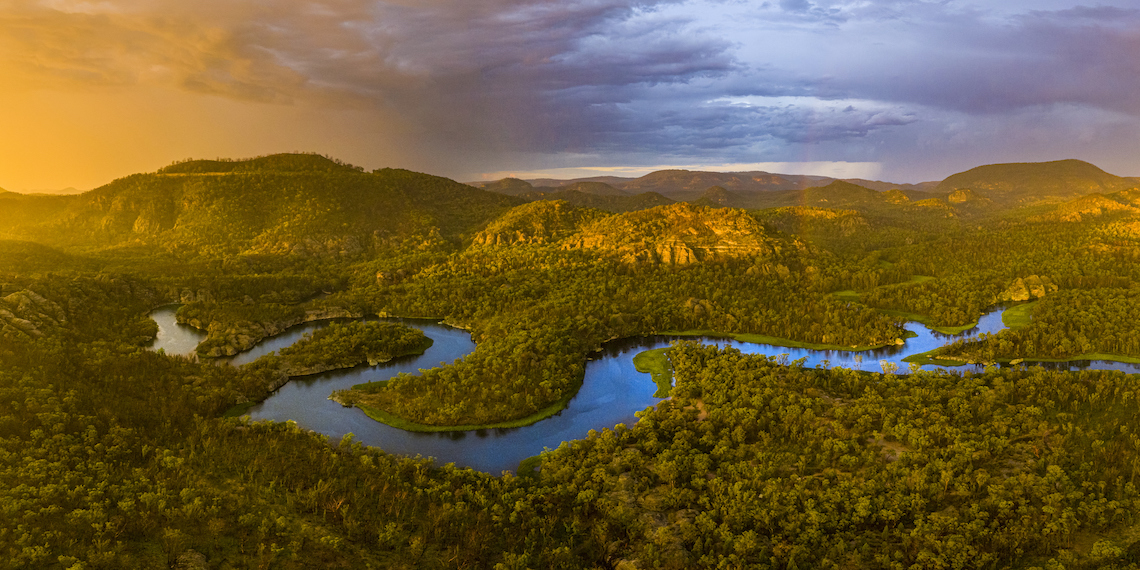Action for and with First Nations communities in water management

A vital workshop session on Day One of Ozwater’23 explored how the water community can move beyond engagement to collaborative and meaningful actions with First Nations people.
The interactive panel was hosted by Todd Phillips, Indigenous Engagement Manager at KBR, and aimed to educate the Ozwater’23 community about the need to meaningfully platform Aboriginal and Torres Strait Islander voices beyond surface-level platitudes.
“We’re going to explore what the water industry can do to better work with rather than for Aboriginal and Torres Strait Islander people towards a sustainable water future that inspires action and places an Indigenous voice at the centre,” Phillips said.
Diversity and law
Bradley Moggridge, Associate Professor of Indigenous Water Science at the University of Canberra, provided a summation of the value of water for First Nations people.
“Water is part of our law,” he said. “It's in our Dreaming, it's in our songs and dances. [But] our diversity is crucial to understand. Working with Aboriginal [and Torres Strait Islander] people, you have to understand our diversity. We're not all the same… We have different languages, laws, customs, and we come from different parts.
“What I'm trying to do in this space, especially around thinking about science, is how can we get back to knowing water the way our old people knew water.”
Part of Moggridge’s passion is the effort to “decolonise” water.
“We find ourselves always battling the settler ways, especially in water law,” he explained. “We see ourselves having to fight for water rights – that’s where we’re at today.
“Water law benefits the settler. We are in a position where, if we want water as Aboriginal people, we have to go to the market and buy it… How can we influence legislation to change that? That's a really tough space.”
The struggle to effect change, however challenging, is essential.
“We have a cultural obligation to protect Country,” Moggridge said.
River catchment health
Michelle Hobbs, Associate Lecturer at Griffith University’s Australian Rivers Institute, spoke about river catchment health from Indigenous perspectives.
“Research shows that looking after catchment health can actually help with some of the big things we're facing now like drought and climate change,” she said. “River health is also an important part of Aboriginal cultural heritage… Our rivers and our landscapes are the result of intentional land management that has gone on for generations over thousands of years.”
Hobbs’ PhD research combines science and cultural knowledge to understand the ecology of freshwater mussels.
“Mussels are culturally significant to Aboriginal peoples in all over Australia, particularly women,” she explained.
“At the end of the mega drought back in 2019, you would have seen pictures of the fish kills in Menindee on the Darling River on the news. There are reports of thousands of mussels dead in the riverbed. I was part of a survey team that went and checked it out and basically counted all the dead mussels.
“The cultural importance and ecological importance of mussels and of rivers is all intertwined together – you can't separate the two. It's understood that they're important for the ecosystem and that aspect is really treasured.”
Water centrality
Phil Duncan, Senior Aboriginal Consultant at Alluvium, who spoke earlier in the day at the Water Leaders Forum, believes that little has actually changed across decades of conversations with First Nations communities.
“We operate in a vacuum of opportunity. People come to us; we suffer [from] consultation fatigue,” he said.
“Water is central to our communities… When you decouple land from water, that couldn't be any further from our cultural ideologies or our holistic view and approach to caring for Country and interacting with Country.
“The missing piece in the whole water debate for me is our culture.”
Duncan challenged the water industry to achieve real reciprocity.
“You can't keep coming and taking our knowledge,” he said. “Reciprocity needs to reign supreme in your mind, if you want to come and engage with us in a meaningful, transparent and inclusive manner,” he said.
“You've got Aboriginal people employed in your utilities, in your businesses, in your operations. They are not just an asset. They are your cultural connector to us – to community.”
Seizing opportunities
Last to speak was Simon Ward, Program Director at SA Water, who illustrated how the company is gradually working to champion Indigenous voices through its projects.
“We work with a specialist consultant, KSJ,” he said. “They've integrated into SA Water, they form part of an integrated team, and they spend a lot of their time assessing our pipeline of projects.”
Ward said the KSJ team helps SA Water approach Indigenous collaboration more effectively “so that we don't let opportunities pass by”.
“We know that every dollar we spend with an Aboriginal or Torres Strait Islander business provides more than $4 of return to society,” he noted.
“There's an incredible opportunity for water utilities to make a meaningful difference and a great contribution to Aboriginal and Torres Strait Islander people and their communities right across Australia.
“We're not at the end of the journey. We haven't gotten to an endpoint that we're really satisfied with.”
